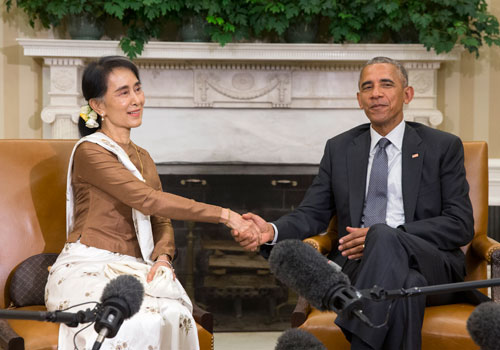-
Tips for becoming a good boxer - November 6, 2020
-
7 expert tips for making your hens night a memorable one - November 6, 2020
-
5 reasons to host your Christmas party on a cruise boat - November 6, 2020
-
What to do when you’re charged with a crime - November 6, 2020
-
Should you get one or multiple dogs? Here’s all you need to know - November 3, 2020
-
A Guide: How to Build Your Very Own Magic Mirror - February 14, 2019
-
Our Top Inspirational Baseball Stars - November 24, 2018
-
Five Tech Tools That Will Help You Turn Your Blog into a Business - November 24, 2018
-
How to Indulge on Vacation without Expanding Your Waist - November 9, 2018
-
5 Strategies for Businesses to Appeal to Today’s Increasingly Mobile-Crazed Customers - November 9, 2018
U.S. lifting sanctions on Myanmar as leader Suu Kyi visits
The US has eased broad economic sanctions since political reforms began five years ago, and Mr Obama has visited the country twice.
Advertisement
The news came as Myanmar’s de facto leader, Aung San Suu Kyi, arrived in Washington on her first official visit.
“In my country, fighting has been going on for decades, ever since we became an independent nation”, Suu Kyi said. The U.S. had cited Myanmar’s refusal to recognize workers’ rights.
Centred on Hpakant in Kachin State, Global Witness estimated Myanmar’s jade trade to be worth $31 billion in off-the-books revenue for 2014, a figure equivalent to half of Myanmar’s official GDP.
The president added that the U.S. is prepared to remove sanctions on Myanmar “soon”. “Now they (U.S. officials) are meeting someone in charge of the government”, said Murray Hiebert, a Southeast Asia expert at Washington’s Center for Strategic and International Studies. “So I think that does reflect important progress inside of Myanmar and I think given that progress, I think it makes sense that the national emergency would be withdrawn and the sanctions lifted”, he said in response to a question. Obama will discuss rolling back more of the sanctions that were applied when the nation was under military rule, and Suu Kyi will be courting the American business community at a dinner where tables go for as much as $25,000.
US economic trade sanctions on the once-isolated Southeast Asian nation of Myanmar are being eased to support the country’s transition toward democracy and a market economy.
Congressional aides earlier said that Suu Kyi had requested the removal of the national emergency order on Myanmar – the executive order authorizing sanctions that have been renewed annually by USA presidents for two decades.
A group of 46 non-governmental organisations circulated a letter they wrote to Obama on Monday expressing concern about easing sanctions on Myanmar while human rights abuses by the military and against Rohingya Muslims persisted.
The wholesale end of executive sanctions will substantially lower the regulatory burden for prospective U.S. investors in Myanmar.
New investment approvals have fallen since Suu Kyi took power in April and some businesses and investors have criticized her for failing to prioritize the economy.
The 71-year-old Nobel Peace Prize laureate is barred by military constitution from technically heading Myanmar’s government, but she got a leader’s welcome in Washington.
“Lifting restrictions on doing business with Burma’s military and its corporate enterprises, as well as the friends and cronies who been enriched by their decades of rule, is not the right thing to do”, said John Sifton, deputy Washington director at Human Rights Watch.
As the military still holds key government features, including border monitoring and the armed forces, Suu Kyi did not push for the lifting of sanctions on military leaders.
Suu Kyi concurred it was time to remove all the sanctions that had hurt the economy.
Advertisement
Various governments and rights groups in the West, as well as the United Nations, have criticised Ms Suu Kyi’s administration for doing too little to alleviate the suffering of the Rohingya, a group of about one million Muslims living in western Myanmar, a lot of them stateless. Instead, she serves as the country’s de facto leader by holding the positions of foreign minister and state counsellor.





























